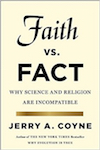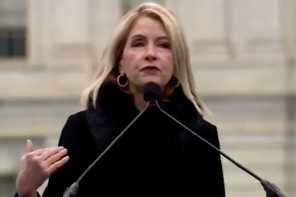Jerry Coyne is an evolutionary biologist, a professor at the University of Chicago, and a prominent atheist blogger, who writes mostly about why faith is stupid (and quite a bit about cats). His new book, Faith Vs. Fact, is a 250-page critique of religion couched in a more modest epistemological argument. “Science and religion,” he writes, “are competitors in the business of finding out what is true about our universe. In this goal religion has failed miserably, for its tools for discerning ‘truth’ are useless.”
It takes chutzpah to argue that most living humans navigate reality incorrectly. But this particular form of chutzpah has become familiar—so much so that it runs the risk of being boring. Do we really need another book arguing that the faithful don’t have the evidence on their side?Maybe. But Coyne doesn’t manage to demonstrate that his book is a necessary addition to that little canon. Instead, Faith Vs. Fact consists mostly of rewarmed arguments from other New Atheist writers. Coyne’s analyses of religion are largely confined to tired smackdowns of marginal groups. The Mormon origin story doesn’t quite make sense! Nation of Islam stories sound weird to outsiders! Islam in general is especially dangerous because “the tight connection between Islam and politics means that beliefs are directly converted to law—often sharia law.” (Cue the ominous music). Faith in general just doesn’t make sense.
We’ve read this all before. So, why bother to review FvF at all? At first, I wasn’t planning to do so, but FvF is useful, insofar as it highlights the questions that Coyne and his intellectual allies seem ill-equipped to ask.
For me, the most revealing part of the book occurs in the opening pages, where Coyne writes:
in the last five hundred years there have been conflicts between science and faith—not continuous conflict, but occasional and famous moments of public hostility. The two most notable ones are Galileo’s squabble with the church…and the 1925 Scopes ‘Monkey Trial’ involving a titanic clash between Clarence Darrow and William Jennings Bryan over whether a Tennessee high-school teacher could tell his students that humans had evolved (the jury ruled no).
A couple of pages later, Coyne refers to “the persecutions of Galileo and John Scopes.” The conflation of the two is clumsy—and telling.
Equating Scopes with Galileo is, at best, a display of historical ignorance; at worst, it’s an exercise in willful blindness. Galileo was an intellectual pioneer. Scopes was the main actor in a show trial. The whole Scopes affair was a publicity stunt, conceived by the civic leaders of the not-terribly-pious town of Dayton, Tennessee, in order to draw attention to their local struggles. Scopes volunteered to take part in the legal drama. A football coach who taught physics, not biology, Scopes was no crusading evolutionist.
Darrow and Bryan were only too happy to burnish their public reputations. The trial was the nation’s first to be broadcast by radio, and it turned into a major media event. The narrative that emerged—principally, of Northern urbanites versus rural Southerners—had obvious links to historical grievances and social power. It also helped shape the modern American creationist movement, which Coyne mistakenly portrays as the cause of the Scopes Trial, rather than a product of its outcome.
I’ve written about this Scopes history before, but it’s not exactly new; the scholar Edward Larson, some of whose other research Coyne cites, wrote a Pulitzer Prize-winning book on the topic in 1997.
Details, details: Coyne will have none of it. “Although both of these incidents,” he writes (of Scopes and Galileo), “have been recast by accomodationist theologians and historians as not involving genuine conflict between science and religion—it’s always construed as ‘politics,’ ‘power,’ or ‘personal animosity’—the religious roots of these disputes are clear.”
Sure: the religious roots are clear. But it’s quite a stretch to describe a staged trial, starring a former presidential candidate and a celebrity lawyer, as somehow not really being about politics and power.
Why am I harping on this one detail? Because it strikes at the core perspective behind FvF. The thrust of Coyne’s project is not just to tackle Big Bad Faith. More deeply, Coyne wants to frame our conversations about religion and science as, fundamentally, a conversation about ideas—specifically, good ideas (science!) versus bad ones (faith). For thinkers like Coyne, the power struggles and politics are distractions. Ultimately, it’s the quality of a person’s thinking that’s at stake.
In some ways, I admire Coyne’s position. There’s a purity to this brand of intellectualism, which rests on a profound confidence in the power of ideas. The opposite approach can be a kind of cynicism (of which I have at times been guilty)—a sense that all these conflicts are just about power, and power alone, such that the content of the beliefs themselves is somehow besides the point.
Coyne and his fellow New Atheist writers are at their gadfly finest when they remind us that people really are motivated by beliefs, and that the specific details of ideas can indeed influence our actions. In the case of Coyne and many of his intellectual allies, what emerges is a vision of a world in which reasoned argument—in which being right—can cure religion and the social ills that supposedly accompany it.
That’s an idealistic, even utopian vision. One need not be cynical to call it naïve. “The ability of people to ignore inconvenient truths that conflict with their faith, whether or not the faith be religious, is astonishing,” Coyne writes, confused that not everyone may have the willingness—or the luxury—to let ideas trump convenience.
Actually, the use of the term “inconvenient” is rather strange here. If you’re a coal miner, the reality of climate change is probably more than an inconvenience for you, especially if climate policy costs you a job. Not everyone is an affluent, tenured Chicagoan who gets paid to think. With his obsessive focus on the correctness of ideas, Coyne is blind to the ways in which class and power can entangle themselves with any kind of belief (including, perhaps, Coyne’s own).
That blindness is chronic; there are essential questions that Coyne doesn’t even think to ask. For example, in a book about the harmful incompatibility of science and religion, he never explains why it’s inherently bad to sometimes hold logically inconsistent beliefs. Within the purity of this ideas-above-all mindset, that awfulness is simply a given. But for those of us curious about the inconsistencies and weirdnesses of actual human experience, it’s not.
I’d love to see some evidence (does Coyne have it?) that holding some inconsistent beliefs is frequently harmful because of that inconsistency.
Or take one of Coyne’s central premises, that “religious claims are empirical hypotheses.” In other words: religious groups make claims about the world that are directly comparable, in their aims and in their applications, to scientific statements.
Setting aside the circular logic of using the methods of science to illustrate the non-science-ness of religion, intuitively this analogy feels strange. If a doctor realizes that I’m dying, she’ll try to intervene immediately. But while my neighbor might think I’m going straight to hell, he generally doesn’t literally run over and try to save me from the fiery pit with every possible effort, which suggests that something a bit more complicated is going on here than a straightforward claim about the universe and our role in it.
When ideas, and ideas alone, are what interest you, though, these finer shades of context don’t seem to matter quite so much. To back his equation of faith claims with scientific claims, Coyne leans on the source of evidence—surveys—that gives the most abstracted version of the messy ways in which people actually think and believe. These are the kind of surveys that ask questions about things like whether you go to church “to worship God” or for “the feeling of community.” They tend to conclude that people take their faith claims very, very literally—in a way that does, indeed, have the rigorous clarity of scientific fact.
Coyne doesn’t seem to consider that how people live their lives, and how people answer IRB-approved questions about intimate topics posed by complete strangers, aren’t entirely congruent. And he pretty much ignores ethnographic analysis of religious groups and the formation of faith.
For someone who has written an entire book about the power of evidence, the omission of such a major field of inquiry is an enormous oversight. Find me an anthropologist who grounds her theory of global culture in a handful of multiple choice surveys, and I’ll find you an anthropologist without a job. Coyne is a biology professor, diving into the territory of other academic fields; why not live up to the standards they set? Once again, the blindness: when the ideas are everything, their formation and application don’t matter.
Coyne isn’t wrong so much as he’s asking old, somewhat lazy questions. Does a scientific worldview provide more accurate knowledge of the world than a faith-based worldview? isn’t a hard question to ask when most of your readers are atheists.
In the process, he avoids the more difficult questions. Is a consistent system of thought an inherent good for an individual? Is a privately-held, unverified belief always harmful? How should one critique the beliefs of a culture other than your own? What would be the challenges of a society in which there were only one method for probing reality?
Coyne doesn’t go there in Faith Vs. Fact. And it’s hard to imagine him doing so. While he seems genuinely fascinated by the ideas that religious movements propose, he seems markedly uninterested in the people who hold them. A commitment to the power of ideas is only half the recipe for strong intellectual inquiry. The other half—the one that’s missing here—is a thirst for new and unfamiliar ways of seeing; which is to say, curiosity.






